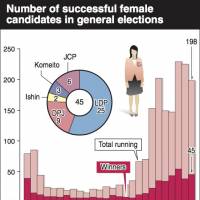Prime Minister Shinzo Abe's call for the empowerment of women was looking hollow Monday after only 45 of the 475 Lower House seats up for grabs went to female candidates.
The figure is a slight improvement on the 38 seats won by women in the 2012 general election, but falls short of the record 54 in 2009, and, at only 9.5 percent of the total, far below the averages of most other major developed nations.
By party, the ruling Liberal Democratic Party had 25 female candidates elected to the Lower House, two more than in the December 2012 election that thrust the party into power.
The main opposition Democratic Party of Japan saw nine women take seats, followed by the Japanese Communist Party, with six, Komeito, the LDP's junior coalition partner, with three, and Ishin no To (Japan Innovation Party), with two.
A total of 198 women ran for the election this time, accounting for a mere 16.6 percent of all candidates. Of them, 22.7 percent won seats.
Both the Gifu No. 1 and Osaka No. 7 districts had all-female contests. The LDP incumbents emerged victorious in both: Seiko Noda, 54, in Gifu, and Naomi Tokashiki, 52, in Osaka.
The Abe administration says wider hiring and promotion of women is key to its structural reforms, pushing for a 30 percent female occupancy of key "leadership" posts in society by 2020.



